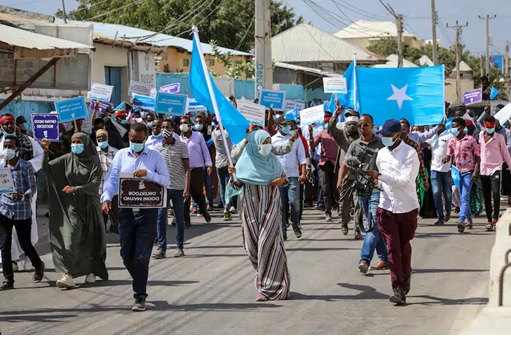Protesters and the population in Mogadishu said that the special forces of the Gorgor Special Division, trained by Turkey, attacked civilians and killed demonstrators, which took Somalia back to the days of the civil war and possibly unleashing a security chaos that will benefit militant forces, especially the al-Qaeda-linked al-Shabaab extremists.

“They attacked us heavily with lots of forces. It is a massacre,” a protester said.
He added that the Gorgor division is taking part in the attack on the protesters.
The Gorgor forces are members of the Somali forces that have received high-level training at the Turkish base in Mogadishu (TURKSOM). Their number ranges between 4,500 and 5,000 supplied with weapons and ammunition from Turkey.
They are stationed in Mogadishu, Tosmurib and Beled Hawo, with TURKSOM as their main base.
In addition to receiving their orders directly from President Mohamed Abdullah Farmajo, these forces are under the command of Turkish officers at the base.
Last December, the Somali opposition had warned Turkey of the dangers of sending arms shipments to the special units it was training.
An eyewitness indicated that Turkish armoured vehicles were deployed in the streets of the Somali capital.
“The military is dissolving and many troops seemingly reverting to clan loyalties,” said Colonel Ahmed Abdullahi Sheikh, who served for three years until 2019 as the commander of Somalia’s U.S.-trained Danab unit.
“It’s a mess. There’s no longer any command structure whatsoever.”
The spillover of political rivalries into conflict will dismay Somalia’s allies and play into the hands of the al Qaeda-linked al Shabaab insurgency, which mounts attacks on civilians around east Africa in its bid to impose its version of Sharia law.
Hours before Friday’s demonstration, former president Sheikh Sharif Sheikh Ahmed accused government troops of attacking a hotel where he was staying with another ex-leader.
Security Minister Hassan Hundubey Jimale accused the opposition of starting the fighting.
“Armed militia attacked government forces. We repulsed and overpowered the militias,” Jimale said in a statement.
In the absence of any mediation, the fighting is likely to spread quickly. Somalia has been torn apart by civil war since 1991. Both the government and the opposition can count on heavily armed supporters.
President Farmajo belongs to the powerful Darood tribe, while most of the army units in and around Mogadishu belong to the Hawiyyah tribe, which is closely connected to the opposition coalition.
It was expected that members of the Somali parliament elect a new president on February 8th. But the process was disrupted after the opposition accused the government of placing supporters in the general and local electoral councils.
The opposition coalition says President Farmajo’s term is over and he is no longer president.
A coalition of opposition candidates vowed not to recognise Farmajo as president anymore, and pledged to organise mass demonstrations until he steps down, starting Friday.
After the incident, opposition leaders held a press conference where they asserted that the shooting was an attempt to assassinate their leaders and that rockets were fired.
Former Prime Minister Hassan Ali Khairi said, “With a number of candidates, lawmakers and civilian protesters, we survived a direct attempt to get rid of us.”
He added, “If anyone doubts the dictatorial political ideology espoused by Farmajo, he can have an idea from the confrontations that took place (today).”
Another leader of the opposition, Abd al-Rahman Abd al-Shakur, said that “the missiles they fired at us hit the airport, causing a lot of destruction.”
The United Nations mission in Somalia expressed deep concern over the armed clashes in Mogadishu during the night and Friday morning and called on all concerned parties to de-escalate the situation and exercise self-restraint. It urged the belligerents to keep communication channels open to help reduce the level of tension.
The mission emphasized the need for the federal government and the states to reach a “political agreement” regarding the elections.
Source: The Arab Weekly


